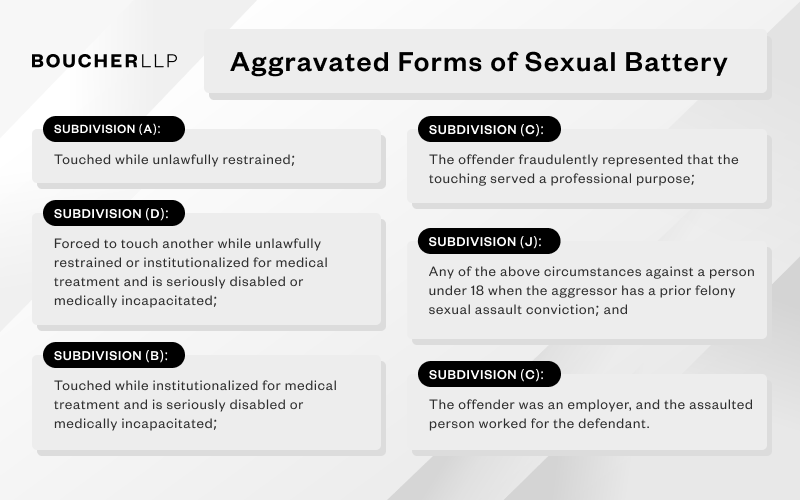
If you are a victim of sexual assault or need help understanding the sexual assault laws in California, reach out to the attorneys at Boucher LLP today.
Our attorneys focus on holding institutions responsible for allowing abuse to occur. We typically do not handle matters involving abuse by a personal acquaintance, family member, or other individual outside of an organization.
Basic respect for human dignity means that every person deserves to be free of unwanted sexual contact at work, school, church, and home.
Boucher LLP wants you to know how the law defines sexual assault in California and what it means for you.
Statistics show that one person experiences a sexual assault every 68 seconds in the U.S. You are not alone. Knowing the basics of the California sexual assault laws can help you feel more in control of your situation.
Once you feel informed, an attorney at Boucher LLP can help you understand your options.
We have dedicated our practice to standing up for those harmed by unwanted sexual conduct. Our team of trauma-sensitive and human-focused attorneys are here for you.
Sexual Assault Definition in California
California Penal Code Section 243.4 defines sexual assault as touching another person’s intimate part against their will for the purpose of sexual arousal, sexual gratification, or sexual abuse.
A sexual assault might be charged as a misdemeanor or felony depending on the circumstances of the crime.
Sexual Battery vs. Sexual Assault
Because “touching another” is an essential element of the crime, sexual assault law in California uses the term “sexual battery.” Typically, assault and battery are separate crimes, defined as:
- Assault—an unlawful attempt, coupled with a present ability, to commit a violent injury on the person of another (Penal Code Section 240) and
- Battery—willfully and unlawfully touching another without their consent. The touching does not have to cause pain or injury so long as it is offensive or harmful (Penal Code Section 242).
There is no distinction between sexual assault and sexual battery in California, and the terms are interchangeable.
Sexual Assault vs. Rape
Both sexual assault and rape are criminal acts in California. One might think of rape as a subset of sexual assault. While sexual assault means unwanted touching of an intimate part, rape is unwanted sexual intercourse.
Rape has distinct criminal elements, including accomplishing intercourse by force, violence, duress, menace, or fear of immediate and unlawful bodily injury.
California Sexual Assault Law Criminal Elements
Before a prosecutor charges someone with criminal sexual assault in California, four factual elements must exist: the person must have (1) touched (2) the intimate part of another (3) against that person’s will (4) for a specific sexual purpose.
Next, we will break down the meaning of these elements.
“Touching” Another Person
To be guilty of sexual assault, the person must have touched another person. “Touched” means physical contact with another person.
For felony sexual assault, the touch must have been to the person’s skin. However, misdemeanor sexual assault includes contact over the person’s clothing.
A touch can qualify as sexual assault regardless of whether it was through the aggressor’s clothing or skin-to-skin.
Touching The “Intimate Part” Of Another Person
Touching a person’s “intimate part” makes an assault a sexual assault. The law defines a person’s intimate parts as the sexual organ, anus, groin, or buttocks. The definition also includes a woman’s breast.
Against The Person’s Will (Without Consent)
Sexual contact must be against the person’s will to be considered assault. If a person does not consent to be touched, the touch is against their will.
To consent, a person must act freely and voluntarily, without coercion or under threats of violence, and be aware of the nature of the touching.
Touching Another For A Specific Sexual Purpose
Sexual assault is a specific intent crime, meaning the offender must have had the intent to commit the crime.
For sexual assault, the offender must intend the touching for a sexual purpose, which includes sexual arousal, gratification, or abuse. Sexual arousal and gratification mean the wrongdoer received sexual pleasure.
When an assaulter intends to cause pain, injury, or discomfort, it becomes sexual abuse. There does not have to be sexual arousal or gratification if abuse is the purpose.
Aggravated Forms of Sexual Battery
When aggravated circumstances exist, sexual assault is a felony. The sexual assault laws in California (Penal Code Section 243.4) include several aggravating circumstances to be considered at sentencing.
These circumstances, identified by their subdivision, include:
- Subdivision (a): Touched while unlawfully restrained;
- Subdivision (d): Forced to touch another while unlawfully restrained or institutionalized for medical treatment and is seriously disabled or medically incapacitated;
- Subdivision (b): Touched while institutionalized for medical treatment and is seriously disabled or medically incapacitated;
- Subdivision (c): The offender fraudulently represented that the touching served a professional purpose;
- Subdivision (j): Any of the above circumstances against a person under 18 when the aggressor has a prior felony sexual assault conviction; and
- Subdivision (i): The offender was an employer, and the assaulted person worked for the defendant.

If the assault occurs along with any of these circumstances, an offender can face imprisonment in a county jail for not more than one year and a fine not exceeding $2,000 or imprisonment in the state prison for two, three, or four years, and a fine not exceeding $10,000.
Boucher LLP: Providing Support to Sexual Assualt Survivors
In addition to criminal penalties, survivors of sexual assault can bring civil lawsuits for money damages. Civil sexual assault cases are easier to prove than criminal cases because the burden of proof is lower.
In a civil case, your attorney presents evidence to prove that it is more likely than not that the perpetrator sexually assaulted you.
However, in a criminal case, a prosecutor must prove the crime beyond a reasonable doubt. Further, the decision to criminally prosecute ultimately lies in the hands of the prosecutor or district attorney..
At Boucher LLP, our attorneys have extensive experience representing victims in civil sexual assault cases. We fight for sexual assault survivors because they deserve to have someone stand up for them.
If you experienced a sexual assault, you do not have to go forward alone. We will listen to your circumstances and explain your options under California sexual assault laws.
It takes a lot of courage to speak out after an assault. We understand that the process of pursuing a sexual assault claim can be overwhelming.
Still, our clients say they feel a sense of closure in defending their legal rights and holding the assaulter accountable. Don’t wait to reach out. Call today.